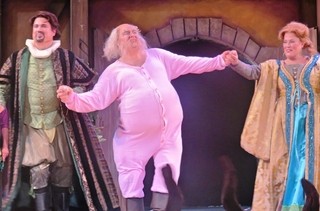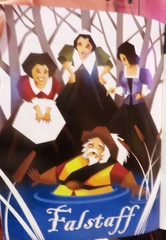|
Back
Oh, What Wonders From The Bard Albany
Saratoga Springs (Spa Theater)
07/01/2017 - & July 6, 10, 15, 2017
Giuseppe Verdi: Falstaff
Craig Colclough (Sir John Falstaff), Caroline Worra (Alice Ford), Vera Savage (Meg Page), Lindsay Armmann (Mistress Quickly), Michael Chioldi (Ford), Michael Anderson (Bardolfo), Jorgeandrés Camargo (Pistola), Max Jacob Zander (Dr. Caius), Emily Tweedy (Nannette), Dominick Corbacio (Fenton), Luke MacMillan (Innkeeper), Baker D’Arcy (Robin), Emma Jane Andrus, Baker D’Arcy, Jamison D’Arcy, Sophia DePaulo, Natalie Mann, Marissa Phillips (Fairies)
The Opera Saratoga Chorus, Laurie Rogers (Chorus Master), The Opera Saratoga Orchestra, Craig Kier (Conductor)
Chuck Hudson (Director), Martin T. Lopez (Scenic Designer) , CeCe Sickler (Costume Designer), Brandon Stirling Baker (Lighting Designer), Sondra Nottingham (Wig and Makeup Designer)

M. Chioldi, C. Colclough, C. Worra (© Samuel A. Dog)
Were our eyes deceiving us? For the 57th Anniversary of Opera Saratoga, were we visited by an obese celebrity with an ersatz title? A monomaniac whose only credo was “Me! Me! Me”? A serial groper? A thief who is too cowardly to steal himself and has others do it for him? An unashamed lecher whose paunch is as sloppy as his endless machinations??
Alas, no. Our American Leader was not on stage in Saratoga Saturday night. Nor could he be. The eponymous figure of Falstaff was, unlike Our Leader, a human being. A piece of Shakespearean fiction far far more truthful than any politician. A man who, in Act I, can rage against the hypocrisy of honor, and in Act III, can cry against the twilight of age and in the same aria–one of the most passionate in all of Verdi’s archives–can satisfy himself by basking on a couch and enjoying warm sherry.
In fact, Falstaff is one of the greatest and most unusual operas in the entire history of opera. And for a compass of emotions as great as Falstaff’s stomach, a director has an infinite way to approach it.
In this new production (Opera Saratoga has presented it several times previously, but this is under their new Artistic Director Lawrence Edelson), director Chuck Hudson almost makes the mistake of creating a piece of buffoonery. Yes, Verdi and Boito were both excited to make a joyous comic opera. But Verdi was not Rossini or Donizetti. He didn’t need the cartoon when he could have characters.
On the positive side, Mr. Hudson made each scene roll happily along. The physical slapstick was in the original libretto, the sarcasm came from Shakespeare (though Merry Wives of Windsor was far improved by Boito). One could have grown tired of the cackling of the wives, though the music made certain they were not monotonously merry. One might have considered the first act a One-Note repetition of unrelenting insults. Except that it emphasized Mr. Hudson’s conception of out-and-out humor.
In fact, this writer had a schizoid reaction about the great dramatic highlight of the opera, the meeting of Mr. Ford (trying to get Falstaff to seduce his wife, while hating him for it) and Falstaff (who already has a trick-assignation). It is one of the great five minutes in comic literature, and Craig Colclough had a ball drinking and winking and greedily shaking out gold coins. Michael Chiloldi played his face like a series of kabuki masks, grimacing, laughing, wincing, gritting, smirking.
Ditto for the wonderful Lindsay Ammann as Mistress Quickly. In Shakespeare’s original, she is a very wicked lady, a woman who relishes revenge the way Falstaff relishes food and drink. Perhaps Boito softened her up a bit, but Mr. Hudson gave her the eye-popping facial changes of young Carol Burnett or the “heroine’s best friend” in a 1950’s television comedy. Did it work? Absolutely!
It was a stupendous tour de force, but so stage-worthy that one almost forgot that this was opera, not vaudeville.
That, though, was my grouchy way of saying that it was damned good theater.
For Falstaff is–to a certain degree–an actor’s opera. And we did have great acting here. The wives, a buxom Caroline Worra and a broom-slender Vera Savage, did cackle merrily, and did emphasize the buffa-operatic glory of the opera. Emily Tweedy and Dominick Corbaccio were the young lovers–definitely out of place in a opera like this. Their arias were Ye Olde Verdi, but they added the charm. The Two Stooges, Michael Anderson and Jorgeandrés Camargo, played Bardolfo and Pistola to a T.
(And the marriage of Bartolo to Doctor Caius at the end was a fitting pre-LGBT paean by Shakespeare and Boito One expected to hear Joe E.Lewis’s last line from Some Like It Hot: “Well, nobody’s perfect”).
But the centerpiece was of course Craig Colclough as Falstaff. Outside of our fear that his grotesque padding might suddenly come tumbling out of him like a fashionista diarrhea, this was a rollicking performance. Mr. Colclough gave it bite, energy, unending vigor, infinite variety. Until the end, perhaps without subtlety, but who needed subtlety??
Their actions, not so much Mack Sennett himself as a black-and-white 1910 comedy with stuttering movie frames was perhaps unnerving, but one soon became accustomed to its multifarious faces.
And now we come to the revelation in this production: the music. Two friends commented that Falstaff was boring because it doesn’t have any Verdi arias. Before this production, I excused it by mumbling that it was Verdi with Wagnerian undertones.
I was in error. The Opera Saratoga orchestra played less-grand orchestral version than usual under the able Craig Kier. And in this case, one could tell that, if anything, Falstaff had too many arias. From Falstaff’s great Honorita aria extolling his great weight to the gorgeous Domine fallo casto, a mock religious chorus to Falstaff’s gloomy panegyric to the glories of wine in old age, Verdi has filled this opera with aria after aria.
The error for the listener is that four or five bars of one aria (say, in the Falstaff-Ford colloquy) could be repeated over and over in, say Puccini or early ordinary Verdi. Here, the 80-year-old composer was so filled with inspiration that he never repeats things at all! He allows these jewels to drop one by one.
Until the finale. My only gripe with every Falstaff production I’ve seen is that the hilarity on stage tends to drown out Verdi’s eight-part fugue. Granted, he did this once before in the “Sanctus” from his Requiem. But a fugue in an opera?? Oh, how I wished that Mr. Hudson had stopped the stage action, lowered the lights and allowed this homage to the joy of life to take its place as one of opera’s hallmarks.

Opera Saratoga Opera Poster (© Opera Saratoga)
A few words on the singing. Nothing to say. From Falstaff to the ladies to the chorus of Fairies, this was great singing. More important, Verdi wanted Falstaff to be played in a smallish theater. The Spa Theater was not small, but sat around 500, a perfect auditorium for such roaring and vocalizing.
The costumes designed by CeCe Sickler, were a rainbow of colors. Yes, we remember Falstaff’s outrageous “wooing” costume of tartan vest, crazy hat etc. But the colors of the entire cast was dazzling enough. One usually remembers the masquerade in the last Haunted Forest scene, but they were no better than the daily stylized Windsor-bourgeois costumes.
A few minor caveats. With no curtain, scene changes were done openly by an army of set people. Yet the background remained the same (even the same goofy-looking deer-head) , so the lengthy changes of props and furniture was a decided distraction. Add to this a plethora of supernumeraries dressed in ordinary Saratoga street clothes. Had this been a cheap production, that might have been excusable. But costume designer CeCe Sickler was so creative for everyone down to the tiniest Fairy, this seemed a distraction.
Never mind. Opera Saratoga has done itself jubilantly proud here, though, truth be told, Falstaff the opera takes first prize. Nothing like it has been written before or since. A mélange partaking of Figaro and Rake with the roaring revenge of Otello (and a fugue befitting of J.S. Bach), this production merely had to partake of Verdi’s candy-factory riches and allow the Opera Saratoga producers to put the spotlight on its infinite musical diamonds.
CODA: The entire Opera Saratoga Summer Festival is filled with original operas. Google Opera Saratoga to get the full listing. Well worth the trip up from New York.
Harry Rolnick
|